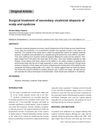IVL-DrugFluidic® can mass-produce high-quality, long-acting injectable drug microspheres, improving patient compliance and reducing side effects.
June 2021 in “International journal of cosmetics and dermatology” Vitamin C and E may help with certain skin and hair conditions, but more research is needed to confirm their effectiveness.
January 2025 in “PROTEOMICS” Drug repositioning is a promising way to quickly develop new treatments, especially for rare diseases.

Women with female pattern hair loss tend to have lower self-esteem and body image concerns, but higher self-esteem is linked to more self-compassion.
 54 citations,
January 2023 in “Signal Transduction and Targeted Therapy”
54 citations,
January 2023 in “Signal Transduction and Targeted Therapy” New therapies are being developed that target integrin pathways to treat various diseases.
 21 citations,
November 2021 in “Biomolecules”
21 citations,
November 2021 in “Biomolecules” Eclipta prostrata is a medicinal plant that helps treat diseases, protects the liver and nerves, and promotes hair growth.
2 citations,
July 2023 in “Animals” FGF10 and non-coding RNAs are important for cashmere goat hair follicle development.
 4 citations,
January 2009 in “Indian Journal of Plastic Surgery”
4 citations,
January 2009 in “Indian Journal of Plastic Surgery” Surgery for scar-related hair loss on the scalp and eyebrow was successful in 75% of patients.
 November 2020 in “Journal of The American Academy of Dermatology”
November 2020 in “Journal of The American Academy of Dermatology” Fluid viscosity affects fracture design and proppant placement in hydraulic fracturing.
 1 citations,
March 1995 in “JAMA”
1 citations,
March 1995 in “JAMA” The woman's hair loss is likely stress-related and should improve without treatment.
15 citations,
July 2021 in “JAMA Dermatology” Androgenetic alopecia negatively affects quality of life and self-esteem, especially in women, but not depression.
 11 citations,
April 2020 in “Journal of Dermatological Treatment”
11 citations,
April 2020 in “Journal of Dermatological Treatment” Taking oral isotretinoin with creams worked better for treating a type of hair loss than creams alone.
 November 2020 in “Journal of The American Academy of Dermatology”
November 2020 in “Journal of The American Academy of Dermatology” Finasteride 1 mg every other month works as well as daily dose for hair loss maintenance.
 1 citations,
September 2023 in “Journal of the American Academy of Dermatology”
1 citations,
September 2023 in “Journal of the American Academy of Dermatology” Baricitinib significantly improves hair regrowth in severe alopecia areata.
 January 2021 in “Anais do Congresso Brasileiro de Reumatologia 2020”
January 2021 in “Anais do Congresso Brasileiro de Reumatologia 2020” Tofacitinib improved arthritis and partially improved hair loss in a lupus patient without side effects.
3 citations,
January 2016 in “Journal of Clinical & Cellular Immunology” Targeting CXCL10 may help treat alopecia areata.
 2 citations,
January 2021 in “Przegląd Dermatologiczny (1959)”
2 citations,
January 2021 in “Przegląd Dermatologiczny (1959)” The article discusses various treatments for different types of non-scarring hair loss.
 1 citations,
January 2023 in “Cutis”
1 citations,
January 2023 in “Cutis” You might not need to stop cancer treatment if you get a rare skin reaction from EGFR inhibitors, as skin treatments can help manage it.
 March 2012 in “Journal of the American Academy of Dermatology”
March 2012 in “Journal of the American Academy of Dermatology” African Americans lack knowledge about laser hair removal safety, Nd:Yag laser treatment is effective with high satisfaction, pressure during surgery can cause hair loss, and treating ovarian inflammation may help with alopecia areata.
 January 2022 in “Springer eBooks”
January 2022 in “Springer eBooks” The book explains causes and treatments for common hair loss, its psychological effects, related health risks, and emphasizes early screening and lifestyle changes.
 October 2022 in “Más dermatología”
October 2022 in “Más dermatología” Early diagnosis and treatment are crucial for managing female hair loss effectively.

Combining stress management and Minoxidil helps treat stress-related hair loss and improve well-being.
22 citations,
August 2011 in “Journal of the American Academy of Dermatology” Topical tacrolimus can effectively treat erosive pustular dermatosis and related hair loss.
 61 citations,
June 2014 in “Scientific Reports”
61 citations,
June 2014 in “Scientific Reports” Wnt1a-conditioned medium from stem cells helps activate cells important for hair growth and can promote hair regrowth.
 February 2013 in “Archives of Disease in Childhood: Education & Practice”
February 2013 in “Archives of Disease in Childhood: Education & Practice” Different types of alopecia in children require specific diagnoses and treatments.
 February 2013 in “Journal of the American Academy of Dermatology”
February 2013 in “Journal of the American Academy of Dermatology” Certain gene variations may increase the risk of alopecia, and platelet-rich plasma treatment can improve hair density in those with hair loss; a rare case of facial Becker's nevus was linked to uneven beard growth.
 February 2005 in “The Journal of Urology”
February 2005 in “The Journal of Urology” Finasteride for hair loss doesn't harm erectile function; weight loss and exercise improve it.
 1 citations,
May 2022 in “Frontiers in Psychiatry”
1 citations,
May 2022 in “Frontiers in Psychiatry” Hair loss was the first sign of a brain-related complication in a woman with lupus, and early treatment helped her hair grow back.
 September 1998 in “Journal of The European Academy of Dermatology and Venereology”
September 1998 in “Journal of The European Academy of Dermatology and Venereology” Phototrichogram helps assess hair loss severity.
 19 citations,
November 2010 in “PubMed”
19 citations,
November 2010 in “PubMed” New genetic insights have improved understanding of hair loss, leading to a new test and treatments, but more research is needed on the test and laser comb effectiveness.






















